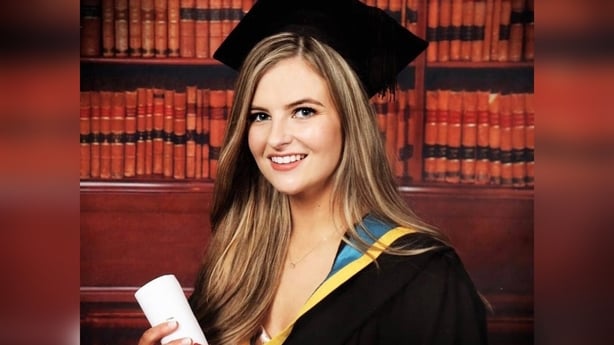A medical expert has told the trial of the man accused of murdering Ashling Murphy that there was no evidence to suggest his admissions to the murder in hospital two days later were related to the effects of any drug.
Jozef Puska, 33, and from Mucklagh in Co Offaly, has pleaded not guilty to the murder of 23-year-old Ms Murphy at Grand Canal Way in Tullamore, on 12 January 2022.
The jury has heard that Mr Puska was admitted to hospital in Dublin the following morning with injuries to his stomach and the next day he told gardaí he did it and he was the murderer.
He went on to tell another garda that he cut Ms Murphy's neck.
Professor Michael Ryan, an expert on pharmacology and toxicology, agreed with prosecuting counsel Anne-Marie Lawlor that he was being called as an expert witness and had been asked to consider if there could have been any substance in Mr Puska’s system that had any impact on him making those admissions.
He said it was his expert opinion that at the time he made the admissions on the evening of 14 January 2022, there was no influence of any drugs affecting his behaviour at that time.

Professor Ryan said he had received an extensive file of documents and had reviewed them all going back to the morning when an ambulance was called for Mr Puska on the morning of 13 January. He said he examined all the drugs administered to Mr Puska from then on, and how long these drugs would have stayed in his system.
He said Mr Puska had keyhole surgery on the evening of 13 January for three "very minor wounds" to his abdomen. He had three puncture wounds of 2cm in length each. He agreed that surgeons found "no major damage".
Prof Ryan said the anaesthetic drugs administered to Mr Puska during the operation would have worn off very fast and would have been completely eliminated from his system by the following evening.
He said the only drug in Mr Puska's system on 14 January that could have had an effect on mood or behaviour was an opiate called oxycodone, which is extensively used for pain relief in post-operative procedures.
But Prof Ryan said any side effects related to oxycodone were mainly seen at higher doses.
He said the doses given to Mr Puska were at the lower end of the scale and by the time he was interviewed by gardaí on the evening of 14 January, there would have been just over 8mg of the drug left in his system.
Prof Ryan said Mr Puska was noted during the day by various medical professionals as "alert and orientated" and during the afternoon was described as completing a transfer from bed to chair with minimum effort.
The professor said the doses of oxycodone received by Mr Puska were at the lower end of the therapeutic scale.
The literature suggested there were no side effects from the drug at a dosage below 10mg. The amount of the drug left Mr Puska's system on the evening of 14 January was around 8.25mg, he said.
He said the literature showed dosages below 10mg had no effect on memory and no effect on mood. None of the medical staff had recorded any indication of sedation and there were no effects recorded on Mr Puska's respiratory system.
Prof Ryan said his conclusion was that there was no evidence to support any suggestion that the admissions made to gardaí were related to the effects of oxycodone or any other drug.
We need your consent to load this rte-player contentWe use rte-player to manage extra content that can set cookies on your device and collect data about your activity. Please review their details and accept them to load the content.Manage Preferences
Prof Ryan was cross-examined by defence counsel, Seoirse Ó Dúnlaing, and agreed that his expertise was in pharmacology and toxicology and not in treating patients on a ward. He agreed he was reliant on the notes medical staff had recorded in relation to Mr Puska.
He said he had been provided with very extensive garda statements as well. Asked about notes made by gardaí in relation to Mr Puska, Prof Ryan said he felt it was not his expertise to interpret them.
He said he was satisfied about the accuracy of the medical notes which he described as "fairly extensive".
Prof Ryan did not recall reading the notes of a garda in which Mr Puska was recorded as asking if he had met the same garda earlier in the day. He said his focus was on the drugs administered and what possible effects they could have had.
Ms Lawlor asked Prof Ryan if it had ever been recorded anywhere, that a person's consciousness or ability to communicate would have been affected by doses of oxycodone below 10mg. He said it had not.
He also said he had never heard of anyone confessing to a murder because of a dose of oxycodone below 10mg. He said pharmacology was a very logical science.
Evidence in the trial has concluded for the day.
The jury will return tomorrow at midday when it will hear evidence from two further prosecution witnesses.
Mr Justice Hunt said he did not know what other evidence, if any, there would be after that.







